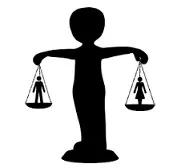 The Latin word aequalĭtas came to Spanish as equality . The concept is used to refer to a correspondence , a balance or a symmetry . It can also refer to equity or conformity .
The Latin word aequalĭtas came to Spanish as equality . The concept is used to refer to a correspondence , a balance or a symmetry . It can also refer to equity or conformity .
Gender , meanwhile, is a term with several uses. In this case we are interested in focusing on its meaning as the group to which a person belongs according to their sex , taking into account sociocultural issues beyond the strictly biological.
The idea of gender equality , in this framework, is a principle that maintains that women and men must have access to the same opportunities and have the same rights and benefits . At the same time, all human beings must be treated with the same respect .
Gender equality, in short, aims to ensure that discrimination based on gender does not exist . This equality is established by law in relation to fundamental rights , but it is often not realized in practice.
In recent years, several countries have managed to advance towards gender equality in multiple aspects thanks to the struggle of the feminist movement . In any case, it is common for women to receive lower salaries than men despite performing the same work or for them to not have the possibility of accessing certain positions within a company, because these are exclusively for men.
Generally, gender inequality to the detriment of women is a consequence of sexist societies or societies organized as patriarchies , where power is distributed in favor of men . This leads to women being subordinate or relegated to men .
 The road to gender equality is long and arduous. As mentioned in the previous paragraph, in a society where patriarchy reigns, it is difficult to avoid inequality, because the government already assigns supreme power to men. Let's just think about the typical "president and first lady" picture: although the title for the husband of a president has also been determined, "first gentleman", given that access to the Executive power by a woman is so rare almost no one knows this expression.
The road to gender equality is long and arduous. As mentioned in the previous paragraph, in a society where patriarchy reigns, it is difficult to avoid inequality, because the government already assigns supreme power to men. Let's just think about the typical "president and first lady" picture: although the title for the husband of a president has also been determined, "first gentleman", given that access to the Executive power by a woman is so rare almost no one knows this expression.
If we continue in this framework we can notice another nuance of contempt towards women that shows that the first lady is on a step lower than her husband: many times a man is called this way in a joking tone, more or less heavy, to attack his masculinity or question his relevance in a relationship, among other cases. This relates to the use of the word homosexual and its synonyms to insult someone.
In short, we are quite far from achieving gender equality, but this does not mean that no one is doing anything about it, but rather that the change must be profound, it must attack the roots of our society . As long as we continue to use the figure of women as a symbol of inferiority to verbally attack men, it will be of no use to improve their salaries or offer them more job opportunities . Giving more space to women in society simply to avoid negative repercussions is just a band-aid: the solution is to ensure that no one considers women inferior to men.
Gender equality should not stop at this binary distinction, but should make way for all people, regardless of their sex and sexuality: we should all have the same rights and the same obligations, access the same opportunities. Only technical knowledge, charisma, experience and skill, among other traits, should allow us to climb within a hierarchy.
